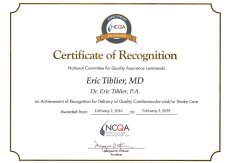Congestive Heart Failure
Many people get worried whenever they hear the words “congestive heart failure,” particularly when they’re told it’s a condition a family member has, or worse, they themselves have. Although this specific condition is viewed by doctors as serious, its life-threatening complications could be managed or postponed for quite some time if it’s diagnosed in its early stages and treated effectively.
What Causes Congestive Heart Failure (CHF)?
Congestive heart failure (CHF) takes place when the heart is not able to pump enough blood to fulfill the body’s need for oxygen. The causes of congestive heart disease fit into 4 main categories: a deterioration of the heart muscle, illnesses such as atherosclerosis which minimize blood flow to the heart, diseases which cause the heart muscle to become significantly less flexible, or diseases that increase oxygen demand by the body tissue beyond the ability of what the heart is able to supply. Learn more about the anatomy of a heart.
This heart problem is a long-term and chronic condition that usually involves each side of the heart. However, the condition might have an effect on just the right side of the heart (right-sided heart failure) or perhaps the left side (left-sided heart failure). The condition develops when your heart muscles are weak and are not able to pump the blood out from the heart properly (systolic heart failure) or when your heart muscles are rigid and don’t fill up with blood very easily (diastolic heart failure).
Difference Between Heart Attack and Heart Failure
A heart attack takes place when a part of the heart muscle, as a result of lack of oxygen, is actually destroyed. If one or more arteries has a major obstruction or narrowing that then is completely obstructed by the development of a blood clot, it hinders or stops the blood flow and oxygen to a part of the heart muscle, and if it lasts for enough time, that heart muscle dies.
Heart failure is a critical and possibly life-threatening condition. Heart failure can also be called congestive heart failure (CHF) which means your heart is not able to pump enough blood to fulfill your body’s needs.
Massive heart attacks, or repetitive heart attacks and damage, can ultimately lead to heart failure, but heart failure can be brought on by many other causes, as well.
Symptoms and Causes of CHF
Congestive heart failure symptoms generally start slowly and gradually and might initially be seen just during periods of activity. However, as time passes, difficulty breathing along with other symptoms might be noticed even at times of rest. Congestive heart failure is an ailment in which the heart turns into an inefficient or fragile pump.
The following are common symptoms experienced by individuals with congestive heart failure:
- Difficulty Breathing When Resting or Being Active
- Coughing
- Leg, Feet, or Ankle Swelling
- Abdomen Swelling
- Weight Gain
- Appetite Loss
- Irregular Pulse
- Low Blood Pressure
- Feeling Weak or Tired
- Heart Palpitations
- Trouble Sleeping
- Inability to Concentrate
- Decrease in Urine Production
- Increased Urination at Night
- Nausea or Vomiting
How Do I Prevent CHF?
For many people who have congestive heart disease, it’s avoidable or even reversible if found early enough. Its causes and effects are directly related to diet and lifestyle choices and, in some instances, to other underlying illnesses which can cause its symptoms. Cigarette smoking, being overweight, diabetes, high blood pressure, physical inactivity, metabolic syndrome, along with diet are all risk factors for this dangerous disease.
These risk factors can result in atherosclerosis, which are lesions within blood vessels. This may lead to arteriosclerosis, which is a thickening, hardening, and calcification of arterial walls resulting in a reduced blood supply. This has an effect on the ability of the heart to do its job in an effective manner. These risk factors may also hurt the heart, deteriorating the muscle itself.
Protecting against congestive heart disease is a matter of living a healthy lifestyle. By sticking with some relatively easy guidelines, most people can keep this disease from ever touching their lives.
Below are a few things to consider in the fight with this disease:
- Exercise Regularly
- Eat More Omega-3 Fatty Acids
- Eat Healthier
- Don’t Smoke
- Control Stress in Your Life
How Should Congestive Heart Failure Be Treated?
Congestive heart failure treatment generally features a regimen of medication, healthy diet, and modified day to day activities. There are a variety of options for congestive heart failure treatment. In many situations, the most effective congestive heart failure treatment is surgery. Heart valve surgery turns into a necessary congestive heart failure treatment whenever a heart valve ceases to open and close in the appropriate way. Valve replacement is the most invasive congestive heart failure treatment and is considered open heart surgery.
Keep in mind, however, everyone is different and CHF treatment may vary from patient to patient. At the Austin Cardiac Clinic, Dr. Tiblier provides customized care for congestive heart failure. Please call us to schedule an appointment today.


